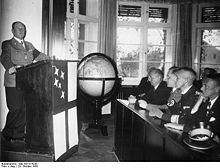- NSDAP Office of Colonial Policy
-
The NSDAP Office of Colonial Policy (German: Kolonialpolitisches amt der NSDAP, K.P.A. or KPA) was a Nazi Party office formed in 1934. Its stated objective was to formulate plans for the re-taking of the former German colonies. The office lost much of its meaning after the start of World War II, and was dissolved after the reversal of Nazi Germany's military victories in 1943.
Contents
History
There were several predecessor organization created in response to the German colonial problem in the Nazi Party. The last of these was the Colonial Section of the paramilitary wing of the Nazi Party, under the central command of the SA-leadership. After the purge of the SA in the Night of the Long Knives it was reformed as the Colonial Political Office in 1934, with Franz Ritter von Epp as its leader. From that point on its task was to provide clear directives and policy guidelines for the party and its press in regard to every colonial-political and -economic problems. In addition the office also formulated plans for the re-acquisition of the former German colonies. In all this it had to completely coincide with the colonial policies of the central regime.
Few sources exist about the early development of the office. Its headquarters was located at the National party seat of the NSDAP in Munich, although the Planning Department was moved to Berlin in 1936. The reason for this was to improve co-operation with the Colonial Section of the Foreign Office. It did not possess any budgetary resources of its own at that point. In order to set up a proper "Colonial budget" it was assigned several state administrators from the Nazi party - a considerable part of its leading experts took over these functions, while the rest was composed of some higher political officials.
Epp's request that his office be assigned a role as the central state body for the formulation of colonial policy was denied by Adolf Hitler in 1938. Its assigned tasks were nevertheless extended. Hitler instructed Von Epp that the office should prepare for a new period of colonial conquest, after which the take-over of the colonies itself would fall within the jurisdiction of the Foreign Office.
In 1940 all Reich departments were subordinated to the Colonial Political Office on overseas colonial matters. With this growth in importance its financial revenues also increased. In 1940 its reported expenditure was more than 870.000 Reichsmarks, an increase of 555% in over earlier years.
The internal structure also underwent some changes. The office transformed itself into both a party organization in Munich and as a state organization in Berlin. Its new leader was the former diplomat Rudolf Asmis. This Colonial Political Office of the NSDAP and the Reich had four different departments and around 260 employees. Of these bureaucrats, 36 were a part of the office's higher and 44 of the mid-level services.
Subsidiary offices were later established in Paris and Brussels to oversee the colonial ministries in these countries.
Colonial Planning
The office prepared plans for a vast colonial domain in Mittelafrika, stretching from Ghana to Namibia and from Chad to Tanzania. In conjunction with the SS a central staff was assembled for the hostile take-over of colonies from Germany's war enemies. It prepared blueprints for the establishment of colonial law, as well as training courses for potential future colonial administrators. In particular it also drew up plans for racial segregation under a "Colonial Blood Law" (Kolonialblutzgesetz).
Dissolution
With the coming end of the Second World War and the resulting victory of the Allies over Nazi Germany the office swiftly lost any degree of importance it might have had. Already in the start of 1943 Hitler had ordered the closure of all Party offices and affiliations which weren't directly connected with maintenance of the war. Together with the Reichskolonialbund it was finally dissolved on 17 February 1943.
See also
- Reichskolonialbund
- German colonial empire
- List of former German colonies
- Mittelafrika
- Franz Ritter von Epp
Categories:- Nazi organizations
- Organizations established in 1936
- 1943 disestablishments
- Nazi Germany
- Nazism
- Colonialism
Wikimedia Foundation. 2010.

